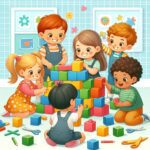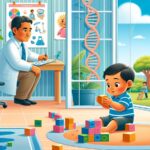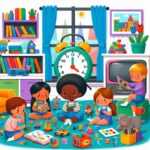Developing a growth mindset in early childhood is akin to planting seeds in a fertile garden, where the nurturing environment fosters strength, resilience, and the ability to overcome challenges. This approach to learning and development empowers children to understand that their abilities can be developed through dedication and hard work. But what exactly does it entail to cultivate such a mindset from a tender age, and why is it crucial for both parents and educators to emphasize its importance?
Understanding the Growth Mindset Phenomenon
A growth mindset, a term popularized by Carol Dweck, is the belief that one’s fundamental abilities can be developed through perseverance and effort. This mindset contrasts sharply with a fixed mindset, the belief that talents and abilities are static traits that cannot change. Developing a growth mindset in early childhood sets the stage for children to embrace challenges, persist in the face of setbacks, and see effort as a path to mastery. It is not just about encouraging more effort but about recognizing and rewarding the process of learning itself.
Research has shown that children who embrace a growth mindset are more likely to persevere when faced with difficulties, ultimately leading to greater achievements academically and personally. A study published in Psychological Science highlighted how students with a growth mindset were more resilient and had higher academic achievements than their peers with a fixed mindset. The implications of these findings are profound, suggesting that the mindset we encourage in early childhood can significantly impact a child’s long-term success.
Strategies for Developing a Growth Mindset in Early Childhood
Developing a growth mindset in young learners involves more than just praising them for their efforts. It requires a comprehensive approach that includes creating a supportive environment, modeling growth mindset behaviors, and providing constructive feedback. Here are some practical strategies for parents and educators:
- Value the process over the end result. Celebrate the effort, strategy, and progress, not just the outcome.
- Use constructive feedback. Focus on what children can do to improve and learn from their mistakes.
- Encourage risk-taking and learning from failure. Help children understand that setbacks are part of the learning process.
- Model a growth mindset. Share your own challenges and how you overcame them through persistence.
- Teach the power of “yet.” Introduce children to the concept that they might not be able to do something ‘yet,’ but with practice, they’ll get there.
Incorporating these strategies into daily interactions with children can significantly influence their outlook on learning and challenges. For more insights on supporting early development, explore our resources on boosting fine motor skills, encouraging self-feeding skills, and navigating social milestones.
Case Studies: Growth Mindset in Action
Real-life examples can powerfully illustrate the impact of developing a growth mindset in early childhood. Consider the case of a preschool where teachers focused on praising students for their effort, strategy, and improvement. Over time, these students demonstrated an increased willingness to tackle challenging tasks and showed resilience in the face of difficulties. Similarly, parents who emphasized learning and improvement over innate talent observed their children becoming more persistent and less afraid of failure.
Another inspiring example is found in the story of a young child struggling with reading. Instead of labeling the child as a slow learner, the parents and educators reinforced the idea that with practice and effort, the child could improve. This approach not only boosted the child’s confidence but also sparked a love for reading that led to significant improvement.
Developing a growth mindset in early childhood is not a quick fix but a long-term investment in a child’s emotional and intellectual development. By focusing on effort, learning from mistakes, and believing in the potential for growth, we can help children build the resilience and perseverance they need to navigate the challenges of life.
For more insights on encouraging developmental milestones and fostering a nurturing environment, check out our tips on the role of sensory play, identifying and nurturing your child’s strengths, and dealing with separation anxiety.













